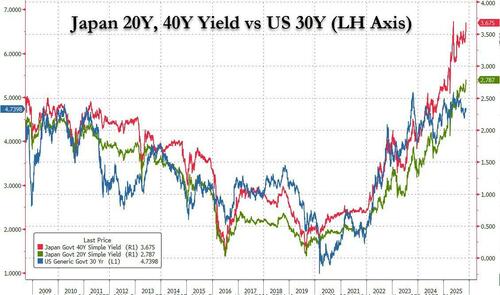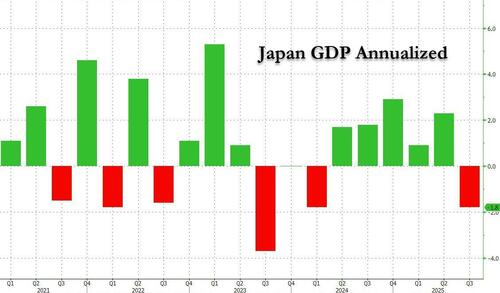Japan Bond Yields Soar To Record, Slamming Door On Stimulus Just As Economy Implodes Amid Escalating China Clash
Back in 2024, it was the story of the summer, but now with a relentless waterfall of news stressing traders – and that excludes the hourly blasts from Trump’s truth social account – it has become impossible to filter the firehose of newsflow, let alone trade it.
Which is why some may have missed the big store of the night which is that Japanese yields are once again breaking out in the back of the curve, with new cycle highs in the 20yr and 40yr weighing on sentiment and risk, and sending the Nikkei not only back below 50K, but below 49K, down 7% from the local record high hit on Halloween.
And with the recent surge in yields, driven by new PM Takaichi’s plans for a fresh stimulus boost (see “Japan ruling-party panel proposes $161 billion extra budget to fund stimulus“), now that the country is basically back in recession after the catastrophic Q3 GDP print which tied for the second worst since covid…
… any plans for fiscal stimulus now are hard to square with the limits of the bond market according to Goldman’s Delta-One head Rich Privorotsky.
But while bond vigilantes may not allow Japan to spend on a fiscal stimulus, it may have no choice but to splurge on defense, as the country’s diplomatic scandal with China is rapidly deteriorating, and is set to be a rerun of the Senkaku Island East China Sea crisis from 2013, which saw almost two years of unprecedented belligernce between the two countries.
In the latest escalation of the deepening dispute between Asia’s two largest economies over Japanese Prime Minister Sanae Takaichi’s comments on Taiwan, Japan warned its citizens in China to step up safety precautions and avoid crowded places. As we reported last week, Takaichi sparked the most serious diplomatic clash in years when she told Japanese lawmakers this month that a Chinese attack on Taiwan threatening Japan’s survival could trigger a military response.
A senior Japanese official met his counterpart in Beijing on Tuesday to try and tamp down the tension, but no breakthrough appeared imminent.
China’s foreign ministry said Liu Jinsong, head of the ministry’s Asia affairs department, had pressed at the meeting for Takaichi to retract her remarks. But Japan’s top government spokesperson, Minoru Kihara, suggested Tokyo was in no mood to do so.
The comments did “not alter the government’s existing position,” Kihara told a press conference on Tuesday, adding that the government hoped issues concerning Taiwan would be resolved peacefully through dialogue.
A video posted on social media by China’s Communist party-run newspaper Guangming Daily showed Liu telling reporters that he was “of course dissatisfied” with the meeting, and described the atmosphere as “solemn.”
A Chinese diplomat in Japan responded to Takaichi’s remarks by posting a threatening comment aimed at her on social media. That drew a strong rebuke from Tokyo, though it failed to stem vitriolic commentary against her in Chinese state media. Takaichi was summoning Japan’s “militarist demons”, the official news agency Xinhua said in the latest such attack on Tuesday.
In view of the media coverage in China, Japan’s embassy there reminded citizens on Monday to respect local customs and take care in interactions with Chinese people.
It asked citizens to be aware of their surroundings when outdoors, telling them to not travel alone and urging extra caution when accompanying children. “If you see a person or group that looks even slightly suspicious, do not approach them and leave the area immediately,” the embassy said in its notice.
The dispute will deal a harsh blow to Japan’s already reeling economy, as Beijing has urged its citizens not to travel there. Chinese form the largest number of all tourists to Japan, accounting for nearly a quarter, official figures show. Tourism-related stocks in Japan plunged on the news.
More than 10 Chinese airlines, such as Air China, China Eastern Airlines and China Southern Airlines, have offered refunds on Japan-bound routes until December 31, while Sichuan Airlines has cancelled plans for a Chengdu-Sapporo route until at least March, state media said.
Film distributors have also suspended the screening of at least two Japanese films in China, a step state broadcaster CCTV hailed on Monday as a “prudent decision” reflecting souring domestic sentiment. Screening of some Japanese films originally set for release in coming weeks, such as the animated “Crayon Shin-chan the Movie: Super Hot! Scorching Kasukabe Dancers” and manga-turned-movie “Cells at Work!” will not begin in mainland China as scheduled, it added, citing industry checks.
Apart from tourism, Japan is heavily dependent on China for supply of critical minerals used in items from electronics to cars.
“If we rely too heavily on a country that resorts to economic coercion the moment something displeases it, that creates risks not only for supply chains but also for tourism,” Japan’s economic security minister, Kimi Onoda, told a press conference on Tuesday.
“We need to recognise that it’s dangerous to be economically dependent on somewhere that poses such risks,” she added, responding to a question about China’s calls for its citizens to avoid travel to Japan.
Japan’s Trade Minister Ryosei Akazawa said there had been no particular changes yet in China’s export control measures on rare earths and other materials. The heads of Japan’s three business federations met Takaichi late on Monday and urged dialogue to resolve the diplomatic tension.
“Political stability is a prerequisite for economic exchange,” Yoshinobu Tsutsui, chairman of Japan’s biggest business lobby Keidanren, told reporters after the meeting, media said.
Meanwhile, sensing blood in the water, China is prepared to instigate a rerun of the Senkaku crisis from a decade ago. On Sunday, Chinese coast guard ships sailed through waters around a group of East China Sea islands controlled by Japan but claimed by China. Japan’s coast guard said it drove the Chinese ships away.
The United States does not formally recognise the islands, known as Senkaku in Tokyo and the Diaoyu in Beijing, as Japanese sovereign territory. Since 2014 it has said it would be obliged by the Japan-U.S. security treaty to defend them if they were attacked, however.
“In case anyone was in doubt, the United States is fully committed to the defence of Japan, which includes the Senkaku Islands, the U.S. ambassador to Japan, George Glass, said on X. “And formations of Chinese coast guard ships won’t change that.”
Chinese foreign ministry spokesperson Mao Ning told a press conference on Tuesday that Glass’s remarks were a “political show with ulterior motives”.
This week’s G20 summit in South Africa offered a possible forum to help ease tension, but China said its premier had no plans to meet Takaichi.
Kihara said nothing has been decided about two-way meetings during G20, but Japan remains open to holding “various dialogues” with China. Japan’s refusal to retract its statements meant its de-escalatory efforts had failed to mollify Beijing, said Allen Carlson, an expert on China’s foreign policy at Cornell University.
“As a result, the two countries now stand on a knife’s edge.”
Tyler Durden
Tue, 11/18/2025 – 17:20ZeroHedge NewsRead More






 R1
R1
 T1
T1


